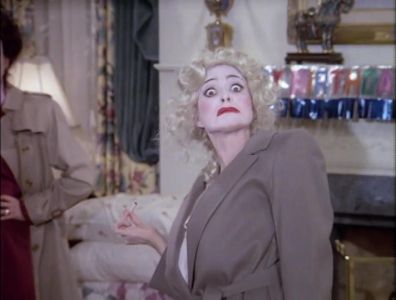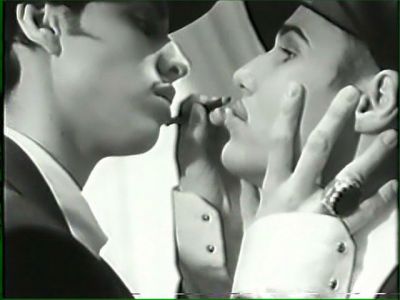Difference between revisions of "Discourse & Identity I & II (Discussion)"
From Screenpedia
Jump to navigationJump to search (group responses) |
|||
| (31 intermediate revisions by 2 users not shown) | |||
| Line 1: | Line 1: | ||
| − | + | ==Four components of feminism== | |
| − | # | + | ''Television'' emphasizes four components of feminism: |
| − | # | + | #"Image of women" feminist criticism |
| − | # | + | #gendered viewing |
| − | # | + | #gender identity |
| + | #third-wave feminism | ||
| − | == | + | See Blackboard for links to videos mentioned below. |
| − | *Julie | + | |
| + | #'''Group 1:''' If you were an analyst using the "image-of-women" approach to analyzing TV, what would you have to say about the episodes of ''Designing Women'' and ''The Real World'' and the ''Justify My Love'' music video? | ||
| + | #*Group 1 Response: | ||
| + | #**''Designing Women'': We thought that the image of women being portrayed showed a woman that was articulate, well informed and had a very individualistic nature. Each woman represented her own thoughts and did not necessarily show a collective group thought but individual thought. | ||
| + | #**''The Real World'': For ''the Real World'', we thought the Image of Women in this one was very shallow. All the women talked about was boys, and the trip the girls went on served only the purpose to meet boys. | ||
| + | #**Madonna Music Video: We thought that this music video showed how Madonna wanted to control her image and how she is portrayed to the general public. We also thought it was very interesting that Madonna chose to have trans women in her video to elaborate on the idea of showing how these women are beautiful and are seen as women. | ||
| + | #'''Group 2:''' If your group were using the "gendered viewing" approach, what would you have to say about the episodes of ''Designing Women'' and ''The Real World'' and the ''Justify My Love'' music video? How would you analyze the actual viewing of these television texts last week? Use your group itself as a test case. | ||
| + | #*Group 2 response: | ||
| + | #**For ''Designing Women'': For this show, we think that the show doesn’t necessarily allows for gendered viewing because the issue concerning Justice Thomas and whether he had committed sexual harassment is confirmed by both men and women on the show. We believe that most people are going to believe what their own gender is arguing for. | ||
| + | #**''Real World'': In this episode, an argument is presented between a male and a female in the show. Women may feel possibly that the woman presenting her side of the argument seems a bit more logical/level-headed, while the male seems belligerent. A male could possibly view this argument as the woman blowing the argument out of proportion or see her as emotional because he brushed the argument off initially. | ||
| + | #**''Justify My Love'':For this video, we think that we as women are indifferent to it. Men could possibly view the video as sexualizing women. Men may go to watch the video to see the stunning Madonna and may ignore the other goings-on in the background. | ||
| + | #'''Group 3:''' If you were an analyst using the "gender identity" approach to analyzing TV, specifically Judith Butler's idea of gender identity as "performative", what examples of this would you draw from the episodes of ''Designing Women'' and ''The Real World'' and the ''Justify My Love'' music video? That is, cite an example of women ''performing'' gender roles in each of these three television texts. | ||
| + | #*Group 3 response: | ||
| + | #**In ''the Real World'' episode, the one character exaggerating her Southern accent to flirt with a guy shows her performing a specific stereotype for male attention. | ||
| + | #**In the Madonna music video, a woman is dressed masculinely and takes more initiative, which causes the viewer to question gender roles. In sexual contexts, women are assumed to be more passive. This music video challenges that and forces the viewer to question if what we consider womanhood or femininity is just a series of actions that can easily be changed at any time, not an innate truth. | ||
| + | #**In the episode of ''Designing Women'', the woman in the She Lied shirt performs as a fancy white socialite, which is a stereotype of women. | ||
| + | #*Ann Kaplan writes, the video for ''Justify My Love'' "forces the spectator to question the boundaries of gender constructs and the cultural constraints on sexual themes and sexual fantasies" (''Television'', p. 417). Explain. Do you agree or disagree? | ||
| + | #'''Group 4:''' If you were third-wave feminist, what would you have to say about the episodes of ''Designing Women'' and ''The Real World'' and the ''Justify My Love'' music video? | ||
| + | #*Group 4 response: If I were a third-wave feminist, I would have nothing negative to say about the episodes and music video. ''Justify My Love'' illustrates messages of sexual positivity. Women are free to express themselves without shame and are accepting of different genders and sexual orientations. In the episode of ''The Real World'' the girls are looking at the men on the beach and making their decisions about the ones they like best. This also illustrates freedom of expression. | ||
| + | |||
| + | |||
| + | ==Casts== | ||
| + | <gallery mode="packed" heights=200px> | ||
| + | File:RealWorldS01Ep08Jamaicaqq00 10 34qq00004.jpg|alt=Screenshot from The Real World.|Screenshot from ''The Real World'': Julie with unidentified man. | ||
| + | File:Designing Women StrangeCaseOfClarenceAndAnitaqq00 20 55qq00011.jpg|alt=Screenshot from Designing Women.|Screenshot from ''Designing Women'': Mary Jo in costume as Bette Davis. | ||
| + | File:Fig13-14 justifymylove 000013.jpg|alt=Screenshot from ''Justify My Love''.|Screenshot from ''Justify My Love''. | ||
| + | </gallery> | ||
| + | |||
| + | ===''Real World''=== | ||
| + | *Julie (from Birmingham) | ||
*Heather | *Heather | ||
*Becky | *Becky | ||
| Line 14: | Line 44: | ||
*Eric | *Eric | ||
| − | == | + | ===''Designing Women''=== |
| − | + | *Anthony Bouvier (Meshach Taylor) | |
| − | = | + | *Mary Jo Shively (Annie Potts) |
| − | + | *Allison Sugarbaker (Julia Duffy) | |
| − | + | *Carlene Frazier Dobber (Jan Hooks) | |
| − | + | *Julia Sugarbaker (Dixie Carter) | |
| − | |||
| − | |||
| − | |||
| − | |||
| − | |||
| − | |||
== Bibliography == | == Bibliography == | ||
| − | #Jeremy G. Butler, ''Television: | + | #Jeremy G. Butler, ''Television: Visual Storytelling and Screen Culture'' (NY: Routledge, 2018). |
==External links== | ==External links== | ||
| + | *[https://tvcrit.org/Classes/Jbutler/TVCrit2018_images_ByChapters/14_2020revision/index.html ''Television'' illustrations, chapter 14] | ||
| + | *Recommended reading: Butler, Jeremy G. [https://tvcrit.com/jbutler/research/RedesigningDiscourse.pdf "Redesigning Discourse: Feminism, the Sitcom and ''Designing Women''."] ''Journal of Film and Video'' 45, no. 1 (Spring 1993): 13-26. | ||
| − | [[Category: | + | [[Category:BUI301]] |
| − | [[Category: | + | [[Category:BUI301 Discussion]] |
| + | [[Category:JCM311]] | ||
| + | [[Category:JCM311 Discussion]] | ||
Latest revision as of 21:54, 1 December 2020
Four components of feminism
Television emphasizes four components of feminism:
- "Image of women" feminist criticism
- gendered viewing
- gender identity
- third-wave feminism
See Blackboard for links to videos mentioned below.
- Group 1: If you were an analyst using the "image-of-women" approach to analyzing TV, what would you have to say about the episodes of Designing Women and The Real World and the Justify My Love music video?
- Group 1 Response:
- Designing Women: We thought that the image of women being portrayed showed a woman that was articulate, well informed and had a very individualistic nature. Each woman represented her own thoughts and did not necessarily show a collective group thought but individual thought.
- The Real World: For the Real World, we thought the Image of Women in this one was very shallow. All the women talked about was boys, and the trip the girls went on served only the purpose to meet boys.
- Madonna Music Video: We thought that this music video showed how Madonna wanted to control her image and how she is portrayed to the general public. We also thought it was very interesting that Madonna chose to have trans women in her video to elaborate on the idea of showing how these women are beautiful and are seen as women.
- Group 1 Response:
- Group 2: If your group were using the "gendered viewing" approach, what would you have to say about the episodes of Designing Women and The Real World and the Justify My Love music video? How would you analyze the actual viewing of these television texts last week? Use your group itself as a test case.
- Group 2 response:
- For Designing Women: For this show, we think that the show doesn’t necessarily allows for gendered viewing because the issue concerning Justice Thomas and whether he had committed sexual harassment is confirmed by both men and women on the show. We believe that most people are going to believe what their own gender is arguing for.
- Real World: In this episode, an argument is presented between a male and a female in the show. Women may feel possibly that the woman presenting her side of the argument seems a bit more logical/level-headed, while the male seems belligerent. A male could possibly view this argument as the woman blowing the argument out of proportion or see her as emotional because he brushed the argument off initially.
- Justify My Love:For this video, we think that we as women are indifferent to it. Men could possibly view the video as sexualizing women. Men may go to watch the video to see the stunning Madonna and may ignore the other goings-on in the background.
- Group 2 response:
- Group 3: If you were an analyst using the "gender identity" approach to analyzing TV, specifically Judith Butler's idea of gender identity as "performative", what examples of this would you draw from the episodes of Designing Women and The Real World and the Justify My Love music video? That is, cite an example of women performing gender roles in each of these three television texts.
- Group 3 response:
- In the Real World episode, the one character exaggerating her Southern accent to flirt with a guy shows her performing a specific stereotype for male attention.
- In the Madonna music video, a woman is dressed masculinely and takes more initiative, which causes the viewer to question gender roles. In sexual contexts, women are assumed to be more passive. This music video challenges that and forces the viewer to question if what we consider womanhood or femininity is just a series of actions that can easily be changed at any time, not an innate truth.
- In the episode of Designing Women, the woman in the She Lied shirt performs as a fancy white socialite, which is a stereotype of women.
- Ann Kaplan writes, the video for Justify My Love "forces the spectator to question the boundaries of gender constructs and the cultural constraints on sexual themes and sexual fantasies" (Television, p. 417). Explain. Do you agree or disagree?
- Group 3 response:
- Group 4: If you were third-wave feminist, what would you have to say about the episodes of Designing Women and The Real World and the Justify My Love music video?
- Group 4 response: If I were a third-wave feminist, I would have nothing negative to say about the episodes and music video. Justify My Love illustrates messages of sexual positivity. Women are free to express themselves without shame and are accepting of different genders and sexual orientations. In the episode of The Real World the girls are looking at the men on the beach and making their decisions about the ones they like best. This also illustrates freedom of expression.
Casts
Real World
- Julie (from Birmingham)
- Heather
- Becky
- Andre
- Norman
- Kevin
- Eric
Designing Women
- Anthony Bouvier (Meshach Taylor)
- Mary Jo Shively (Annie Potts)
- Allison Sugarbaker (Julia Duffy)
- Carlene Frazier Dobber (Jan Hooks)
- Julia Sugarbaker (Dixie Carter)
Bibliography
- Jeremy G. Butler, Television: Visual Storytelling and Screen Culture (NY: Routledge, 2018).
External links
- Television illustrations, chapter 14
- Recommended reading: Butler, Jeremy G. "Redesigning Discourse: Feminism, the Sitcom and Designing Women." Journal of Film and Video 45, no. 1 (Spring 1993): 13-26.


